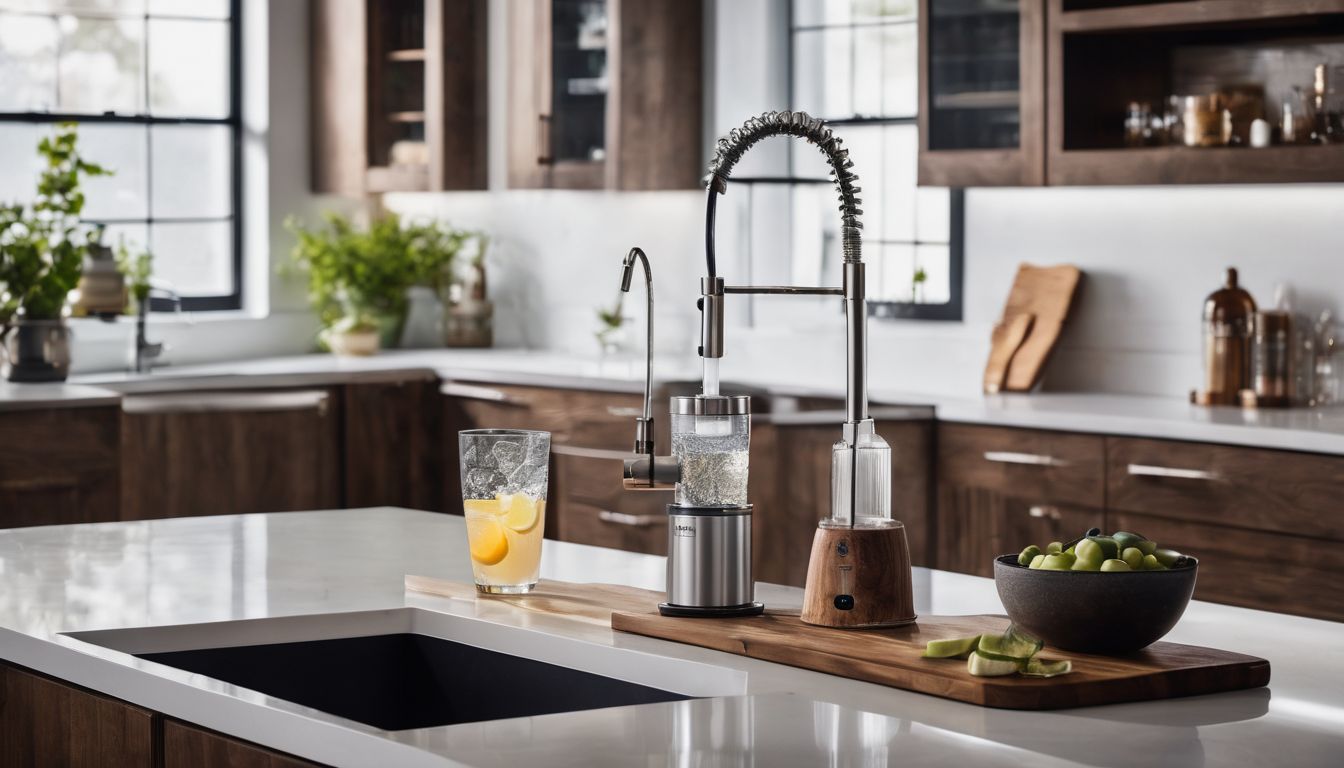Are your electricity bills soaring each month? You’re not alone – households worldwide are feeling the pinch as energy costs rise. This article offers practical tips on how to slash those bills by using your home appliances and electronics more wisely.
Read on, save money!
Key Takeaways
- Select appliances with the Energy Star label and high energy ratings to ensure maximum efficiency, saving money on electricity bills while reducing environmental impact.
- Unplug devices when not in use to avoid standby energy consumption; this simple habit can lead to significant reductions in your home’s overall power usage.
- Opt for cold water when washing clothes as it conserves energy and extends the lifespan of your garments, contributing positively to both your finances and the environment.
- Seal gaps around doors and windows with weather – stripping or caulking to maintain a regulated temperature indoors, lowering the need for excessive heating or cooling.
- Choose appliances that are appropriate for the size of your household needs, avoiding unnecessary excess capacity which leads to wasted power.
The Importance of Reducing Energy Usage in the Home
Reducing energy usage in the home is crucial for both cutting down on electricity costs and minimising environmental impact. Energy efficiency not only saves money but also helps to reduce greenhouse gas emissions, making it a key factor in sustainable living.
Benefits of Energy Efficiency
Energy efficiency in your home leads to reduced utility bills, allowing you to save money every month. These savings can add up significantly over time, providing extra cash that can go towards other household needs or savings goals.
More efficient use of energy also means less strain on power plants and a decrease in greenhouse gas emissions, contributing to conservation efforts and a healthier environment.
By choosing energy-efficient appliances and electronics, you’re taking part in eco-friendly living. Not only do these products use less electricity but they often come with advanced features designed for optimal performance.
This translates into fewer resources wasted and supports the transition to sustainable living practices. With each energy-saving tip implemented at home, from using renewable energy sources to adopting powersaving settings on devices, individuals play an active role in green living initiatives while enjoying a comfortable lifestyle.
Impact on the Environment
Energy-efficient appliances and electronics contribute to a significant reduction in energy consumption, leading to a smaller carbon footprint. By choosing energy-efficient models and unplugging devices when not in use, we can lower electricity usage and decrease greenhouse gas emissions.
This conscious decision supports environmental conservation by reducing the demand for fossil fuels used in power generation and mitigating the impact of climate change.
When considering the environmental impact, it’s crucial to prioritise energy-saving practices to protect our planet’s natural resources for future generations. Next, let’s delve into specific energy-saving tips for kitchen appliances that can have a positive impact on your home’s energy efficiency.
Energy-Saving Tips for Kitchen Appliances
– One way to save energy in the kitchen is by choosing energy-efficient models when purchasing new appliances. This can greatly reduce electricity usage and lower your monthly bills.
– Another tip is to air seal your home to prevent drafts, which can help regulate the temperature and make your appliances work more efficiently.
Choosing Energy-Efficient Models
When choosing new appliances and electronics, look for the Energy Star label to ensure energy efficiency. Check the product’s energy rating and choose models with high efficiency to lower electricity costs.
Consider the size of the appliance or electronic device, ensuring it matches your needs without wasting energy. Look for economy settings that optimise energy usage, reducing environmental impact while saving you money on utility bills.
Always compare the total cost of ownership, including energy usage over time, to make an informed decision about which model is truly the most cost-effective in terms of lowering electricity costs and reducing overall energy consumption.
Unplugging Unused Appliances
Unplugging unused appliances can significantly reduce energy consumption in your home. Simply keeping devices like toasters, coffee makers, and chargers unplugged when not in use can prevent “phantom” or standby power usage.
This easy habit helps to lower electricity bills and minimises the environmental impact of unnecessary energy usage.
By making a conscious effort to unplug unused appliances, you contribute to conserving energy and reducing your carbon footprint. Switching off and unplugging devices not only saves money but also plays a role in promoting an eco-friendly lifestyle.
Washing Clothes in Cold Water
To further reduce energy usage, consider washing clothes in cold water. This not only saves electricity but also helps to preserve the lifespan of your clothing. Cold-water washing is an effective way to conserve energy and minimise the environmental impact of your laundry routine.
When washing clothes in cold water, you can achieve clean and fresh results while reducing energy consumption. Additionally, using cold water helps to prevent colour fading and shrinkage in fabrics, making it a practical choice for environmentally conscious individuals looking to reduce their carbon footprint.
Air Sealing the Home
To prevent the loss of heated or cooled air, seal any gaps around windows and doors. Weather-stripping or caulking can be used to seal these gaps effectively. A professional can also assess and seal larger openings that may not be visible.
By doing this, you can reduce energy waste and maintain a comfortable indoor temperature in an environmentally friendly manner, ultimately lowering your electricity bill.
It’s important to note the significance of maintaining a well-sealed home, as it not only reduces energy consumption but also minimises the impact on the environment. Sealing air leaks is an effective way to make your home more energy-efficient while contributing to conservation efforts.
Using the Microwave
After air sealing the home to reduce energy consumption, using the microwave for cooking can also contribute to saving electricity. Microwaves use less energy than conventional ovens and cook food faster, minimising electricity usage.
When possible, opt to use the microwave instead of the oven for reheating or cooking small portions of food. By choosing this method, you will not only save time in meal preparation but also lower your overall energy consumption.
If there’s an option between using a microwave and a traditional oven, consider going for the former as it consumes far less power while delivering hot meals efficiently and effectively.
Energy-Saving Tips for Electronics
Unplugging Devices When Not in Use is an easy way to save energy and reduce electricity usage. Choosing Energy-Efficient Products can also make a big impact on reducing the power consumption of your electronic devices.
Unplugging Devices When Not in Use
To save energy, unplug devices when they are not in use. This simple action prevents standby power consumption, reducing electricity usage and lowering utility bills. By unplugging unused appliances and electronics, you contribute to a more eco-friendly home environment while also decreasing your carbon footprint.
Furthermore, this practice aligns with energy-efficient home tips and supports the efficient use of kitchen appliances and home electronics.
When you unplug devices when not in use, you actively participate in reducing energy consumption at home. This small change can make a big impact on energy efficiency and environmental conservation efforts.
Choosing Energy-Efficient Products
When purchasing new appliances and electronics, consider choosing energy-efficient products. Look for devices with high energy ratings as they consume less electricity, reducing your carbon footprint and lowering utility bills.
By selecting eco-friendly models, you contribute to conserving natural resources and minimising environmental impact.
Evaluate the total cost of ownership, including operational expenses and maintenance when investing in energy-efficient products. Choose appropriate-sized appliances tailored to your household needs while prioritising economy settings for optimal energy efficiency.
Selecting these products facilitates sustainable living practices whilst supporting conservation efforts and promoting a greener environment.
Key Things to Consider When Buying New Appliances & Electronics
When purchasing new appliances and electronics, it’s important to consider the total cost, energy ratings, appropriate size for your home, and economy settings. These factors can help you make more environmentally friendly choices and save on electricity costs in the long run.
Total Cost
Consider the total cost of an appliance or electronic device, including purchase price, energy consumption, and maintenance expenses. Look for products with a high energy efficiency rating to save money over time while reducing environmental impact.
Factor in long-term savings from reduced energy bills when making purchasing decisions.
When choosing new appliances or electronics, examine the total cost, not just the upfront price tag. Selecting energy-efficient models can result in significant long-term savings on electricity bills and contribute to a more sustainable home environment.
Energy Ratings
When purchasing new appliances and electronics, it’s essential to look for energy ratings. These ratings indicate the energy efficiency of the product, helping you make informed choices that reduce electricity consumption.
Energy-efficient models can save you money in the long run and contribute to environmental conservation by reducing your carbon footprint.
Energy ratings provide a valuable guide for environmentally conscious individuals seeking to lower their energy use. By choosing products with high energy ratings, you can help protect the environment while enjoying cost savings on your utility bills.
Selecting appliances and electronics with high energy ratings is a simple yet impactful way to support conservation efforts.
Appropriate Size
When selecting new appliances and electronics, choosing the appropriate size is crucial. Oversized items consume more energy than necessary for your needs. Look for models that are sized to match your usage patterns to minimise wasted energy.
Be mindful of the capacity when purchasing refrigerators, washing machines, and other appliances to ensure they fit your household’s needs without unnecessary excess.
Moving on from – Appropriate Size, let’s dive into “Economy Settings” for additional ways to maximise energy efficiency in your home.
Economy Settings
To further reduce energy consumption, make use of the economy settings on your appliances and electronics. Activating this feature helps to regulate power usage, ensuring that your devices operate in an energy-efficient manner.
By utilising economy settings on kitchen appliances and electronics, you can decrease electricity consumption without compromising functionality.
When considering new purchases, opt for models equipped with eco-friendly or energy-saving modes. These settings can significantly contribute to reducing your overall energy usage while still meeting your household needs.
Conclusion
In conclusion, reducing energy usage at home is crucial for the environment. Choosing energy-efficient appliances and electronics can significantly lower electricity consumption. Unplugging unused devices, washing clothes in cold water, and using economy settings are simple steps towards energy conservation.
Remember to consider total cost, energy ratings, and appropriate sizes when purchasing new appliances and electronics for an eco-friendly home.
FAQs
1. What are energy-saving tips for appliances and electronics?
Energy-saving tips include using energy-efficient appliances, turning off devices when not in use, and employing electricity saving techniques to reduce power consumption at home.
2. How do energy-efficient kitchen appliances save money?
Energy-efficient kitchen appliances consume less electricity compared to standard ones; this means they can significantly cut down your bills with their energy use reduction capabilities.
3. Can changing my habits really help me save on home electronics energy use?
Absolutely! Adopting energysaving ideas like unplugging chargers and switching devices off rather than leaving them on standby can lead to reducing energy consumption in your household.
4. Are there specific energysaving tips for industries as well?
Yes, industries can apply energysaving ideas designed specifically for them by upgrading to ecofriendly electrical devices that lower both operational costs and environmental impact.
5. What benefits come from investing in energyefficient home appliances?
Investing in such devices helps you save on utility bills while also contributing positively towards the environment due to their reduced environmental impact over time.





